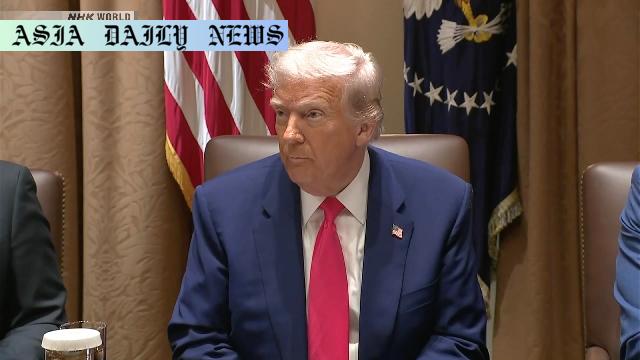Iran: US President Trump rejects Iranian supreme leader Khamenei’s victory claim and urges Tehran to rejoin world order.
Trump disputes Iranian leader Ayatollah Khamenei’s claim of victory over Israel and the US.
US President warns Iran to rejoin the world order or face worsening consequences.
Trump dropped plans to lift sanctions due to Khamenei’s statement of ‘anger, hatred, and disgust.’
The US President emphasizes leadership benefits in diplomacy using a ‘honey over vinegar’ metaphor.

Trump Criticizes Khamenei’s Victory Claims
US President Donald Trump has publicly disputed the claim made by Iran’s Supreme Leader Ayatollah Ali Khamenei that Tehran’s forces achieved a ‘victory’ over Israel and the United States. Khamenei made these statements during his first public address following a ceasefire announcement with Israel. Trump dismissed these remarks as baseless and labeled them as outright lies. The president accused Khamenei of spreading false narratives to bolster domestic morale while warning of the dangerous consequences Iran could face if it continued on its current trajectory.
Sanctions and Diplomacy: Trump’s Rapid Shift
According to Trump, he was considering lifting certain sanctions on Iran as a gesture of goodwill and as an incentive for reconciliation. However, after Khamenei’s speech, which Trump described as filled with ‘anger, hatred, and disgust,’ the president decided against lifting any restrictions. Instead, Trump reiterated a warning that Iran needs to return to the ‘world order flow’ or face even harsher punitive measures. This sudden shift highlights the fragile state of US-Iran relations and signals the president’s frustration with Tehran’s leadership.
Encouraging Diplomacy: The ‘Honey Over Vinegar’ Message
In his latest statement, Trump offered a piece of practical advice to Iran’s leadership, urging them to consider the benefits of diplomacy. By quoting an old adage, ‘You often get more with honey than vinegar,’ he encouraged Iranian officials to adopt a cooperative stance rather than one rooted in hostility. This metaphor underscores the president’s belief that mutual cooperation could open diplomatic doors and potentially ease tensions between nations. This diplomatic reminder, while earnest, is juxtaposed against the backdrop of Trump’s firm rhetoric and history of sanctions against Iran.
The Larger Global Implications
The ramifications of Trump’s statements extend far beyond US-Iran relations. They touch upon larger geopolitical issues involving Israel, Middle Eastern strategy, and the influence of global superpowers on regional politics. Khamenei’s fiery rhetoric and Trump’s equally bold responses bring into focus the challenges of peace-building in a complex international landscape. Both leaders seem to be playing to their domestic audiences while grappling with the international stage, which remains precariously balanced amidst these diplomatic tussles.
The Path Forward for US-Iran Relations
The ongoing tension between the United States and Iran showcases the complexity of finding common ground in diplomacy. While Trump’s call for Iran to rejoin the “world order flow” implies a potential for dialogue, it also places pressure on Tehran to align with international standards and norms. The ultimate success of such a strategy will depend on whether both sides are willing to engage in meaningful discussions and move beyond inflammatory language. For now, however, the friction between these nations remains palpable, with no clear path forward in sight.
Commentary
The Importance of Tone in Diplomacy
President Trump’s statement regarding Iran and its leadership offers an intriguing insight into the complexities of modern diplomacy. While his criticism of Ayatollah Khamenei is sharp, he also extends an olive branch by advocating for cooperative measures. This duality—balancing sanctions with calls for dialogue—reflects the challenging nature of global politics. For any dialogue to succeed, the tone and messaging conveyed by leaders hold immense power. Trump’s ‘honey over vinegar’ metaphor serves as a reference to this, highlighting how diplomatic language can influence outcomes.
The Role of Leadership in Global Stability
Both President Trump and Ayatollah Khamenei represent strong but polarizing leadership styles. While one embraces a pragmatic approach with grand gestures, the other opts for a more defiant demeanor that speaks to national pride. This dichotomy in leadership approaches underscores the importance of finding common ground amidst clashing ideologies. Both leaders must recognize that the continuation of tensions could have substantial ripple effects, not just for their nations but for global stability as a whole.
The Stakes for Iran’s Place in the World Order
Iran’s role in the global order is a subject of great importance, not only to its citizens but also to neighboring nations and international superpowers. For Iran, rejoining the ‘world order flow’ as suggested by Trump could mean alleviating economic sanctions and improving its global standing. Conversely, rejecting such calls may lead to deeper isolation and harsher penalties. This pivotal moment in Iran’s history will likely shape its position on the international stage for years to come. The choices made now by its leadership could either pave the way for economic reform and global integration or perpetuate conflict and instability.


